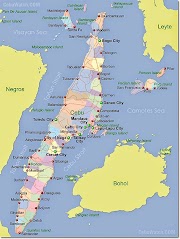Routes
"It is expected to become the first operational bus rapid transit project in the Philippines. Only one line has been planned in detail so far, but scheme developers note the potential to develop a larger network comprising the adjacent cities Lapu-Lapu, Mandaue and Talisay. Leadership in both Lapu-Lapu and Mandaue have shown interest in the network. It is expected the first route could be operational by the end of 2014. "
Ticketing and Fares
Ticketing is likely to use pre-pay smart cards like that used for Rapid Transport in Singapore and Hong Kong. The pre-feasibility assessment for the BRT route states that if the fares were charged at the same level as Jeepneys then the ticket revenue would be US$15 million per year, of which US$1.5 million is expected to be profit/surplus
The Department of Budget and Management (DBM) on Wednesday announced it had released funding for Cebu’s Bus Rapid Transit (BRT) system, which is expected to spur economic activity in Visayas.
“Once completed, the project will give Cebu’s commuters a fast, comfortable and cost-effective mode of transportation,” Budget Secretary Florencio Abad said in a statement.
The DBM announced it had approved the funding strategy and likewise issued a Forward Obligational Authority (FOA) to the Department of Transportation and Communications (DOTC) for the Cebu Bus Rapid Transit (BRT) project in the total amount of P9.48 billion.
The new bus transit—which will be funded through loans from Agence Francaise de Development (AFD), the International Bank for Reconstruction and Development (IBRD) and the Clean Technology Fund—would provide a safer, more efficient and environment-friendly mode of travel in and around Cebu city.
“The main idea here really is to emulate a modern rail-based transit system at a much lower cost,” the DBM said.
The DBM’s approval would “allow the government to process the loans for the project. The FOA will also help us in avoiding unnecessary commitment fees along the way.”
As approved by the National Economic and Development Authority (Neda) board, the Cebu bus rapid transit system will be undertaken this year and finished in 2018, with a total project cost of P10.62 billion.
The Forward Obligational Authority (FOA) issued by DBM covers P9.48 billion of this amount—a combination of the national government contribution and loan proceeds—in accordance with the approved funding strategy submitted by the DOTC.
The remaining P1.14 billion will be shouldered by the private sector and will be mainly utilized for the purchase of necessary motor vehicles.
“The implementation of the project alone will open various employment opportunities for the construction and manufacturing sectors,” Abad said.
Credits: inquirer and wikipedia





.jpeg)



.jpeg)
0 Comments